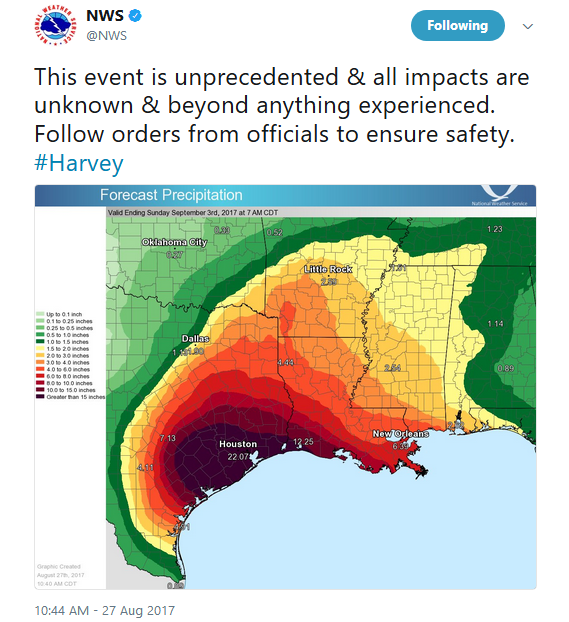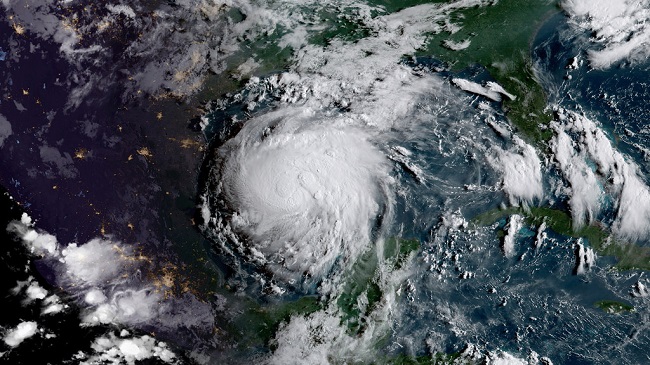September 2, 2017 – Hurricane Harvey: Predicting and Coping with the New Normal
![]() You know you’re truly in uncharted territory when the National Weather Service posts tweets like this:
You know you’re truly in uncharted territory when the National Weather Service posts tweets like this:

As of this writing, what’s left of Hurricane Harvey continues to spin through the Ohio River Valley towards its final destination somewhere in the northeastern part of the United States and beyond. It feels as though this particular event has been with us for months, though the reality is that we haven’t hit the two week mark.
Not only did the storm leave trillions of gallons of rainfall and hundreds of thousands of displaced persons in its wake, it has also spawned what might be called a cottage industry of “hurricane journalism.” Looking for a an angle on the coverage? How about climate change?
How Hurricane Harvey Became So Destructive (New York Times)
Hurricane Harvey Was No Surprise (New York Times)
Did Climate Change Intensify Hurricane Harvey? (The Atlantic)
Did Climate Change “Cause” Harvey? (NRDC)
It’s a fact: climate change made Hurricane Harvey more deadly (Michael Mann in The Guardian)
Another popular subject is Houston’s land use policies. To get a real handle on why Houston just can’t quit flooding, read Boomtown, Flood Town, a superb article with interactive maps put together by Pro Publica and The Texas Tribune. Presciently, it was published in December, 2016. Here are more:
Houston Wasn’t Built for a Storm Like This (Slate)
Don’t Blame Houston’s Lax Zoning for Harvey’s Destruction (Slate)
Houston Is Drowning—In Its Freedom From Regulations (MSN)
Houston is a sitting duck for the next big hurricane. Why isn’t Texas ready? (Grist…from 2016!)
Harvey, the Storm That Humans Helped Cause (New York Times)
The Political Roots of Houston’s Flooding (The Nation)
How about an ineffective flood insurance program?
How Washington Made Harvey Worse (Politico)
Flood insurance is a mess, and Harvey won’t make Congress any more likely to fix it (The Sacramento Bee) National Flood Insurance Program is the next storm for hurricane survivors (The Hill)
Perhaps you want to know why a chemical plant is being allowed to explode in slow motion just outside of Houston.
The Chemical Plant Explosion in Texas Is Not an Accident. It’s the Result of Specific Choices. (Esquire)
The Smoke from Hurricane Harvey: Looking Beyond the Crosby Chemical-Plant Explosion (The New Yorker) The disaster in Crosby is purely man-made. (Houston Chronicle)
Then there is the social justice issue.
Race and Class Are the Biggest Issues Around Hurricane Harvey and We Need to Start Talking About Them (The Root)
Houston Flooding Always Hits Poor, Non-White Neighborhoods Hardest (Huffington Post)
One of the more remarkable pieces about how we contribute to our own natural disasters states,
First they settled and farmed in floodprone areas. Then they drained wetlands and farmlands that used to sponge up water during floods. Then they built levees and flood walls that imprisoned rivers into tight channels, walling them off from their natural flood plains. And all those artificial barriers — as well as a generous federal flood insurance program — have inspired a false sense of security that encourages even more Americans to build in those flood plains. Thus the cycle continues.
That quote is from an article in The Washington Post from May 6, 2001! In other words, a lot of policy hasn’t changed in sixteen years. Yet, clearly the climate is changing. For goodness sake, something is changing. Houston, a city that is addicted to rampant, minimally governed development, just had its third major flooding in three years. Are we supposed to believe that this is some kind of bad streak? That mother nature is having a little family-friendly flooding fun? That a municipality can expand its borders with impunity and never suffer the consequences? That only fools choose to protect the land rather than cash in on it?
When we decided that The Mike Nowak Show was going to focus on Hurricane Harvey this week, we knew exactly who to contact. Her name is Harriet Festing, and she is director of Flood Forum USA, which exists to help individuals and communities affected by flooding get organized, heard and supported. Flood Forum USA is an initiative of the Chicago-based nonprofit, Anthropocene Alliance, which she co-founded in April of this year.
Prior to her work with Anthropocene Alliance, Festing worked as Director of Water & Climate Resilience for the Center for Neighborhood Technology (CNT) and was founder of their Rain Ready initiative. She played a key role in the Congressionally mandated study on Urban Flooding in the United States as author of the bill that established the study, and currently serves as a member on the National Academy of Sciences committee.
She is joined on the show this morning by meteorologist Rick DiMaio, who has kept us apprised of the progress of Hurricane Harvey. In fact, last week, the day before Harvey hit the coast of Texas, he wrote,
This is the perfect size storm in just the right part of the Gulf of Mexico at the right time of the year for rapid development.
Sea surface temps are close to 87 deg F which is about 1 deg warmer than the 30 year average. I mention this since often times people immediately want to associate any large hurricane with climate change. However, the Gulf of Mexico is slightly warmer than normal with the heat content also slightly above normal. Therefore, the warming of the earth and our changing climate can NOT be immediately attributed to the strengthening of Harvey. However, it needs to be addressed that population change and land use change can alter the impacts of weather systems and climatic events that previously produced minimal impact.
We will look at the connection between climate change and natural disasters during our conversation. We will also ask the question, could it happen here–meaning Chicago? That takes us to a piece written by Stephen F. Eisenman, a co-founder of the Anthropocene Alliance and Flood Forum USA, in the Chicago Sun-Times. It’s called Chicago, once a swamp, also could be walloped by a catastrophic flood. He writes,
The latest National Climate Assessment, prepared by experts from four government agencies, predicts that climate change will lead to an approximately 20 percent increase in “extreme rainfall events” in the Midwest over the next few decades, on top of the 20 percent increase during the previous three decades. This will result in more flooding, soil erosion, declining water quality and damage to homes and infrastructure.
So should we expect Houston-style flooding events in Chicago? Probably not on the same scale. But we are already experiencing major flooding and significant harms to homes, businesses and communities.
In addition, climate change and the city’s stalled embrace of easily available green solutions are certain to make matters worse in coming years. We need to adapt now by embracing simple and inexpensive technologies such as permeable paving, green roofs, tree planting, development of bioswales and disconnection of downspouts to prevent the overfilling of sewers.
We are devoting the entire program this morning to the above issues. Unfortunately, we will barely scratch the surface, but at least it’s a start.



Pingback: September 10, 2017 – Reclaiming Plastics and Toxics – The Mike Nowak Show